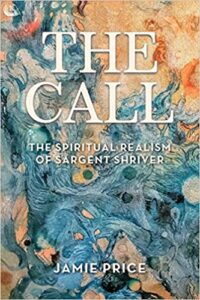Review | THE CALL: The Spiritual Realism of Sargent Shriver
The Call: The Spiritual Realism of Sargent Shriver
by Jamie Price
336 pages
SSPI Press
March 2023
$11.49 (Kindle); $22.00 (Paperback)
The Call looks at the role of the spirit in the life and work of one of the most accomplished American peacebuilders of the 20th twentieth century, Robert Sargent Shriver (1915-2011), founder of the Peace Corps and architect of the War on Poverty. Author Jamie Price knew Shriver personally and served as the Founding Director of several programs dedicated to understanding and advancing Shriver’s approach to leadership and peacebuilding.
The Call is an imagined dialogue between Sargent Shriver and the character of Didymus about the role of the spirit in Shriver’s efforts to build peace. Its title alludes to the pivotal moment when Shriver received the phone call from his brother-in-law, the newly-inaugurated President John F. Kennedy, asking him to be Director of the as-yet-nonexistent Peace Corps. This “true conversation that never happened”, informed by Shriver’s hundreds of speeches, philosophers and theologians who inspired him, and conversations between Shriver and the author, is an intimate, unique, often funny exchange about the inner workings of a mind always questioning the relationship between spirit and social action. A must-read for aspiring leaders, innovators, and peacebuilders seeking to redress contemporary challenges to human dignity and security, The Call invites readers to navigate conflict and nurture human connection with creativity and compassion.
Since Jamie Price’s background is in philosophy, he’s drawing on the Socratic tradition to convey Sargent Shriver’s approach. Jamie refers to it as a “true conversation that never happened”. Sargent Shriver’s voice is reconstructed from his speeches and from past conversations that Jamie had with Sarge. Didymus is fictional. The name Didymus is connected to the name “Thomas”, as in the apostle Thomas, who doubted that Jesus had risen from death and asked for proof. Jamie says that Sargent Shriver referred to Thomas as “empirical Thomas” rather than “doubting Thomas” because he sought out facts to confirm what he was being told. The idea is that Didymus is looking up to Sargent Shriver as a mentor and wants to understand in detail what motivated Sargent Shriver and how he was able to do what he did.
Jamie Price is the Founding Director of the Sargent Shriver Peace Institute, which he led for its first twenty years. He has held faculty positions in religion, philosophy, and conflict resolution at Georgia State University, The Catholic University of America, George Mason University, and the University of Chicago. Jamie lives and works in New York City.
Charles Hefling taught theology, philosophy, and Great Books for thirty years as a professor at Boston College. He has translated and edited works of Bernard Lonergan and served as Editor-in-Chief of The Anglican Theological Review. His most recent book is The Book of Common Prayer: A Guide (Oxford, 2021). Charles lives and works in Cambridge, Massachusetts.

WHAT SEEMS TO BE A GREAT MATTER
I went to Ghana in 1961 in the first Peace Corps group to go abroad,
landing in Accra,end of August, via Dakar, Senegal and The Azores from Washington DC
where President John F. Kennedy met us in the Rose Garden,
then was photographed with each of us at his Oval Office desk.
Fifty of us, twenties to thirties, a charmed generation trusting progress
and a basic goodness of all persons.
All the while there seemed to be a stranger within me,
an intruder who was not me, yet part of me, who swallowed as I drank
and who’d die when I’d die.
Our ‘strangers’ are sharpie fine-pointed pens who write us,
life forces leading, lifting us through our nights.
Who /what this is baffles me. It’s not mythic. It is here now. We pass from history.
This life force continues.
We’re stewards, mechanics, actors, helpers. Actions matter, thoughts matter.
All flow into this great final matter.
We believed in progress, in the basic goodness of all persons.
There was a stranger inside of me, an intruder, who was not me,
yet part of me
who swallowed as I drank:
I’ve lived as if he’ll die when I die.
I now begin to see that our ‘strangers’
within us are the sharpie fine pointed pens
we thought “we” wrote with, but really are the life force,
forces who lead, encourage, lift us through our nights.
What this is baffles me, but it’s not mythic.
It is here now. We pass out of history. This life force continues.
While we live we are stewards, mechanics, actors, helpers
We matter, our actions matter, our thoughts matter.
In our end all our beginnings are organized into this great matter.
Most everyone here thinks the world of it.
Yet here is not the world: that atlas speaks other climes.
Here’s mind’s province. Beyond here worlds have
No cause looking back, now. Out there becomes then a here.
From personal to political to spires, further and higher to travel.
What was here then, there, remains. Here, now, resting time, still we seek.
Beyond circles is twisting, continuing. Turning what was then back, forward,
Here returns, but not here’s beginning.
That words dream motion makes life glorious
puts raw silk to silence, gives music tongue,
reveals nature becomes prairie garnet and peridot
leaving the wind behind In all the rainbow colors.
© Copyright Edward Mycue
This is a beautiful statement/poem which spoke to me. Thank you so much Edward.